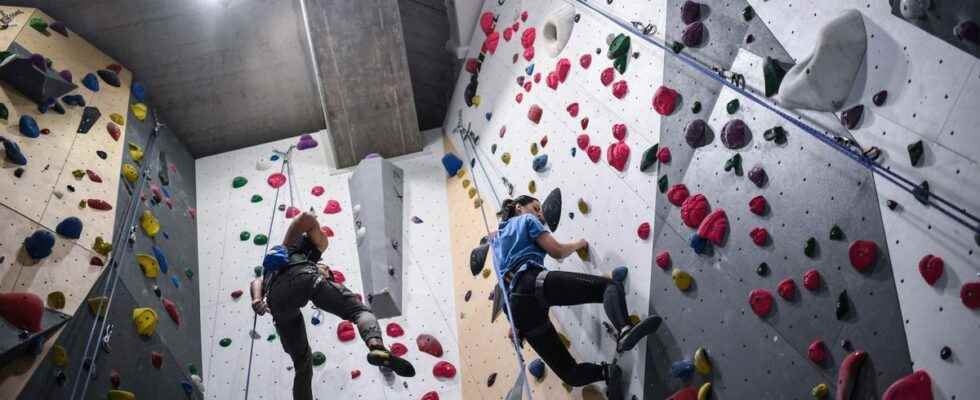Published on
Updated
Reading 3 mins.
Momentary fad or real ground swell? Climbing is developing at high speed in France, boosted by private rooms that are more user-friendly than the old-fashioned gymnasiums, which are attracting more and more followers.
“It’s really the popular sport of the moment”, believes Zoé Armbruster, hanging from the blue sockets of the bright room of Arkose Nation in Paris. This 33-year-old climber, who started in the United States, became disillusioned when she returned to settle 6 years ago in the French capital. To continue, she had to register in a federation. But recently, the number of private rooms has “exploded, it’s crazy, everyone is getting into it!“.
“Over the past five years, there has clearly been an acceleration“, confirms to AFP Grégoire de Belmont, and this is felt within Arkose: the chain, which he co-founded in 2013, now has 21 rooms and plans to open 4 more in 2023.
Their “climbing loft” in Nation, with its industrial glass roof, its large sofas, its restaurant and its microbrewery, is emblematic of these new private rooms, offering for the most part bouldering walls, where the young active CSP+ climb without being insured. 25-35 years old.
France now has about 200 trading rooms and more than half have developed “the last ten years“, according to Ghislain Brillet, president of the young union of the Union of climbing rooms.
“Super Flexible”
In two decades, the sector has gone from a few isolated rooms run by enthusiasts to large networks of actors, each with their line, more sporty or bobo.
“The number 1 in number of rooms is Climb’Up (29 rooms), in turnover it is Arkose“, explains Mr. Brillet, “then we find behind, in a pocket handkerchief, Vertical’Art, the Altissimo and Block-Out string rooms“.
To explain this boom, Mr. Brillet evokes a strong media presence since the entry of climbing into the Olympic Games, the fact that this “completely mixed” sport allows “men and women, beginners and advanced to practice together” and the “friendliness“places compared to low-cost gyms.
For him, the market has been able to build itself in complementarity with the French Mountain and Climbing Federation, where the routes rarely change and the slots are limited. “It’s super flexible here, we can come here and there for an hour, it’s much more compatible with our way of life.“, confirms Zoé Armbruster, who also appreciates being able to “train on bouldering“, when the FFME essentially offers route.
Benefits that its president Alain Carrière does not deny, who, like many of the 110,000 licensees, also climbs in private rooms. Not governed by a commercial logic, the saturated Federation is struggling with a lack of means, but it has the advantage “to have big clubs in small provincial towns, which will never have private rooms“.
“It’s a bit like two opposite worlds working together“, summarizes Jules Delourme, spokesperson for Vertical’Art. The chain, which will soon open two new rooms and has “others on the radar”, accumulates “more and more practitioners”, especially by “the mouth by ear”.
350 million euros
“Every day, we have between 60 and 70 new people who come“, explains Mr. Delourme, seated at the café of their room in Pigalle in Paris, which swarms with agitation at the end of the morning, between parents waiting for the end of the session of their children and groups of climbing friends having a coffee.
The Parisian halls of Arkose mix 400 to 800 people every day, which is well above the “250 climbers needed to make the dining room profitable”, explains Grégoire de Belmont. The Covid still weighs on the group’s accounts, but he hopes that the 35 million euros in turnover expected this year will skyrocket next year.
According to a study by the Union Sport et Cycle, private rooms represent around 350 million euros in cumulative turnover in 2022, but the climbing market – including equipment purchases/rentals and sports tourism – combines more than 650 million euros.
And this market, “the most profitable sector” for sports equipment manufacturers with “enormous margins”, will “continue to increase”, estimates sports sociologist Eric Boutroy, thanks to trading rooms, “main driving force today for the rise of rock climbing“.
